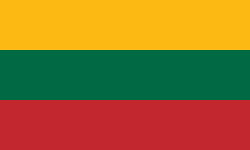Lithuania
Lithuania is a small country in the north of Europe. It's often mentioned together with other Baltic states, Latvia (to the north) and Estonia (to the north of Latvia). It also borders Kaliningrad,![]() the Russian region disconnected from the rest of Russia, Poland, and Belarus. 2.83 million people live there.
the Russian region disconnected from the rest of Russia, Poland, and Belarus. 2.83 million people live there.
In the 1300s, the Grand Duchy was the largest country in Europe, occupying what is now Belarus, Ukraine, part of Poland and part of Russia. Interestingly, it had still not adopted Christianity at the time (see Christianization of Lithuania![]() ). The gentry rapidly Polonized, and (similar to Belarusian) the Lithuanian language was relegated to the language of the peasantry; the last Grand Duke of Lithuania who spoke Lithuanian died in 1492. Lithuanian itself was only written down in the mid-1500s, making the Baltic languages the second to last attested Indo-European language family, only before Albanian. In 1569, it entered into a real union with Poland, and the resultant state was for a brief time the dominant power in the region. Eventually, however, it was partitioned up among its neighbors, with most of modern Lithuania going to Russia.
). The gentry rapidly Polonized, and (similar to Belarusian) the Lithuanian language was relegated to the language of the peasantry; the last Grand Duke of Lithuania who spoke Lithuanian died in 1492. Lithuanian itself was only written down in the mid-1500s, making the Baltic languages the second to last attested Indo-European language family, only before Albanian. In 1569, it entered into a real union with Poland, and the resultant state was for a brief time the dominant power in the region. Eventually, however, it was partitioned up among its neighbors, with most of modern Lithuania going to Russia.
The Lithuanian state was reestablished in 1918, with its capital at Kaunas, but took a severe beating in the interwar period, losing the highly contested city of Vilnius (Wilno) to Poland (while Vilnius had been the capital of Lithuania in the 1300s, it had long since Polonized and at that time only around 1% of its population even spoke Lithuanian; its contemporary inhabitants were overwhelmingly ethnic Poles and Yiddish-speaking Jews) and Memel (Klaipėda) to Nazi Germany. After the Molotov–Ribbentrop Pact (known mostly for dividing Poland between Stalin and Hitler), Even if the Soviet Union and Nazi Germany allowed Lithuania to strip Poland of Vilnius, it was occupied by the Soviet Union in 1940 and annexed as a member republic. In 1941, Nazi Germany invaded the Soviet Union, and many Lithuanians hoped that such would bring independence to Lithuania. Hitler had his own plans of course, incorporating it into a colonial mass called "Ostland" comprising what had been Estonia, Latvia, Lithuania, the Belorussian SSR, and northeastern Poland, whose Jews were to be exterminated quickly, whose Slavs were to be enslaved, and whose Estonians, Latvians, and Lithuanians were to be 'assimilated' as Germans. The once-large (in comparison to the population) Jewish population—which largely spoke Yiddish, a Germanic language, and not Lithuanian—had greatly distinguished itself in its intellectual achievements. Nazis (with some assistance from Lithuanian nationalists, who saw collaboration as their chance to establish a Lithuanian ethnic state) practically obliterated the Jewish population of Lithuania in the Holocaust. Upon recapturing Lithuania from Nazi Germany, the Soviet Union re-attached the Memel strip that Nazi Germany stripped from Lithuania in 1939 back to Lithuania—but as part of the Lithuanian Soviet Socialist Republic.
After establishing dominance over the Lithuanian SSR, especially after the de facto ethnic cleansing of Vilnius, Lithuanians simply wanted to be free of the "Soviet" and "Socialist" part of their occupied country's official name, and some continued armed guerrilla resistance against the Soviets for many years after the Second World War. It was the first Soviet republic to declare independence in 1990 (dropping the "Soviet" and "Socialist" part of the name within the Soviet Union and simply becoming the Lithuanian Republic or Republic of Lithuania which Lithuanians had wanted to be since 1918), causing the Soviet military to intervene, killing some civilians. After the bungled coup against Soviet President Mikhail Gorbachev, even the Soviet Union officially recognized its independence, including Klaipeda and Vilnius. It joined the European Union in 2004, at the same time as nine other countries (all but two ex-Communist ones). In 2004, together with 6 other European states, it became a member of NATO.
See also[edit]
- Daniel Estulin - Lithuanian byproduct.
